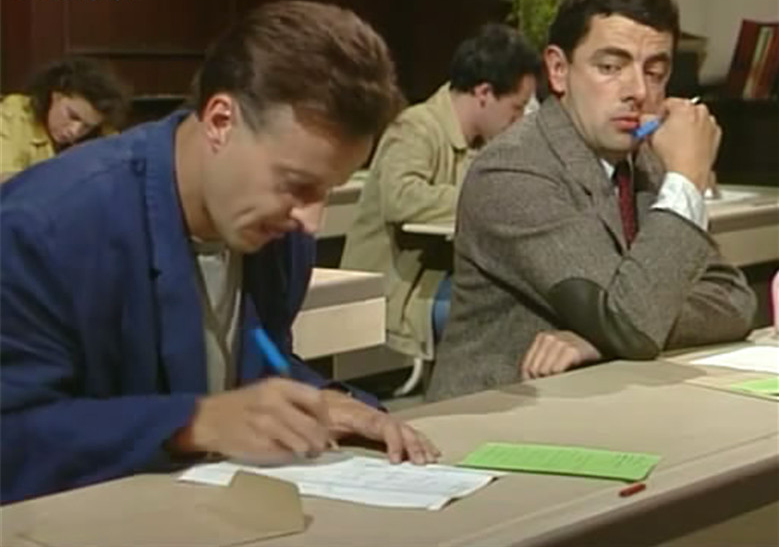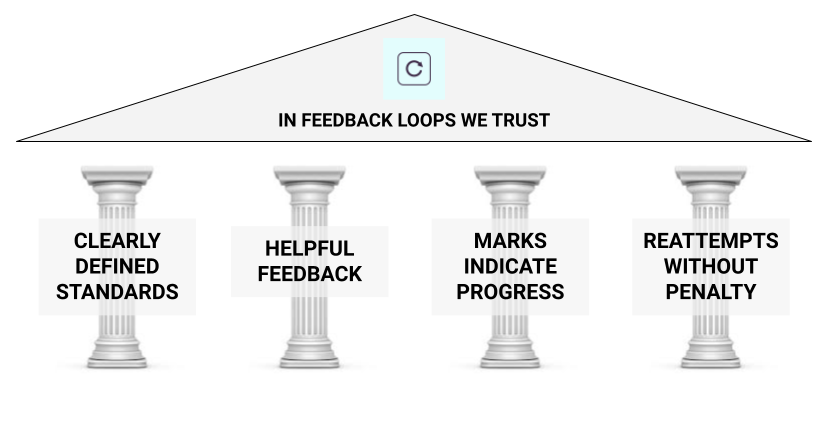How specifications grading changed my view of academic dishonesty

This article originally appeared at Grading for Growth, a blog about alternative grading practices that I co-author with my colleague David Clark. I post there every other Monday (David does the other Mondays). Check the end of this post for some extra thoughts that don't appear in the original.
Click here to subscribe and get Grading for Growth in your email inbox, free, once a week.
Let's discuss academic dishonesty, by playing a game of attribution. Guess who wrote the following:
Academic dishonesty is not only easy to catch, it’s a horrible miscarriage of the mutual trust upon which all of education is built, and students who willfully engage in it deserve all the punishment they receive, if not more. There’s simply no rationalizing it, and I don’t think we in higher ed do nearly enough to eradicate it.
And this:
[Academic dishonesty is] more than just youthful indiscretion, like drinking too much at a frat party or sleeping through an exam [...]. Academic dishonesty is a willful, intentional violation of trust, and if you are a professor and have a shred of respect for the life of the mind, you have to do something about it, even if it might earn you a reputation as a mean SOB among students.
I don't know what went through your mind as you read those, but I was thinking: This person isn't necessarily wrong, but they seem to care a lot more about the integrity of "academe" than they care about their students. (Assuming they’re an educator in the first place; from these snippets, who can tell?)
If you found those words hard to read, then imagine what it's like for me to read them. Because I'm the one who wrote them, in two separate blog posts (here, and here) on the same day, almost 14 years ago.
It gets better. I also wrote this two years earlier:
The question is really one of economics. If you cheat on a quiz, for instance, and “earn” yourself five points by short-cutting mastery of some material -- and then go and take a test that has 20 points of questions on the same material, and you lose all 20 because you didn’t master that material -- then you are 15 points in the hole. There is a net loss in the process of cheating or plagiarizing, even if you don’t get caught. And if you do get caught, the stakes go that much higher. It’s rational choice theory applied to the classroom.
Regardless of what you think of these blasts from the past, they illustrate an important point: How we grade and how we think about academic dishonesty are deeply interconnected. As my beliefs and practices about grades have evolved over the last 25 years since started my career, my beliefs about academic dishonesty have changed significantly. If you’re using alternative grading or thinking about it, perhaps those beliefs are changing for you as well.
That was then
The definition of academic dishonesty that I am using (and in my mind have always used) is from our student handbook: It is “any action or behavior that misrepresents one’s contributions to or the results of any scholarly product submitted for credit, evaluation, or dissemination.” This includes cheating, collusion, dual submission, falsification, and plagiarism — or enabling other students to engage in these.
Up until a few years ago, I used traditional grading 100% of the time. My view of grades as “really a question of economics”, while cringe-worthy, is perfectly rational in that context. In traditional usage, grading consists of a system of points, incentives, and transactions — driven by scarcity, supply, and demand. It’s a little economy, living there in my classes.
If grades and grading are a form of economics, then academic dishonesty is a form of fraud. It’s cheating the rules of the system to get something for yourself that you didn’t earn. This may not be a wrong way to think about it in any case. But if you take the economic point of view on grades, academic dishonesty is not just undesirable, it’s illegal, something to be prosecuted. And in fact, in my old syllabi I used to write about how I’d “prosecute” instances of academic dishonesty when (not if!) I discovered them.
In the past, I pursued academic dishonesty with the zeal of an inquisitor. I didn’t want to see academic dishonesty in my classes. But if you committed academic dishonesty in my classes, then God help you. Because I would spend hours on Google hunting down the precise Stack Exchange post, the exact paragraph on the exact page of the PDF posted elsewhere where the answer was copied. And then I would do the following:
- I would call the offending student (or one student at a time if there was a group involved) into my office and politely ask them to talk about their work — and listen like a prosecuting attorney ready to pounce on an inconsistency.
- At some point, I would make a clever and dramatic shift along the lines of: “I had something else to discuss with you about this work. Here’s your work. [Lay out the student’s work.] And here’s [another student’s work | a Wikipedia article | a website | whatever]. These are very similar as you can see. Can you give me some context for what happened here?” I used to call this “the reveal”, like they do on those house-makeover shows.
- Then I would expect an answer, specifically either (1) a “confession” (that legal language again), (2) a legitimate explanation, or (3) a BS explanation.
- Then I would take all this information and administer a penalty I thought would be fair under the circumstances. Sometimes it was no penalty. But often what would go through my mind is that I wanted to give the harshest penalty that I could justify.
Those days were not happy ones. I had academic dishonesty issues at least once a semester, often more. Sometimes those cases were fraught; at least one of them involved a parent showing up to my office with a gun. It’s difficult to know which came first, the unhappiness or the hard-line stance I was taking.
But even when the situation was clear-cut and someone who blatantly broke the rules got their just desserts, it wasn’t satisfying for long. Because what exactly did it accomplish? Did I have any evidence that this made the student any better at math, or at life? The answer is no. I can’t even prove that the students who were caught and punished ended up avoiding academic dishonesty in the future — that they’d learned their lesson. Indeed some did go on to do it again.
This unhappy and unproductive state is all because of points and the economies we create around them. I’m not sure how we instructors are supposed to expect students not to be tempted into academic dishonesty, when we monetize academic success and create artificial scarcity around it.
This is now
But if you think of grading as a means for growth, then you will take a very different path. The best way I can explain this is with a real-life example that happened to me recently, with a student in a class where I was using specifications grading.
My student had turned in a problem set with one solution blatantly copied and pasted from a Stack Exchange post. Literally, the only thing the student did was Control-C the work and Control-V it into their submission. The terminology was weird, there mathematical symbols on the page that didn’t render in the student’s Word document… not one pixel of that webpage was processed in the student’s brain. It was the perfect cut-and-dry case that, circa 2008, would have had me buzzing with the anticipation of catching a cheater red-handed and suplexing them with the Student Code.
But then I started thinking about a couple of things.
First was the four pillars of alternative grading:

I thought, What’s the point of my grading system or of any grading system? The Four Pillars here don’t say it explicitly, but the point is growth. Whatever grade I give to student work or at the end of a course, it needs to signify and promote growth. Thinking about this (comically amateurish) picture made me think differently about the student’s situation. Rather than take sick pleasure in “prosecuting” an open-and-shut case of academic dishonesty, maybe this could be used as an opportunity to help the student learn something? To grow?
I also thought a lot about my friend Spencer Bagley, who on Twitter has said a lot about what he calls cop shit — the kinds of Law-and-Order cosplay that professors often engage in when they are out to “prosecute” something. This tweet in particular, and the thread it belongs to, stood out for me:
The whole reason why I, a person who fundamentally does not believe in cop shit, still want to check a student about """cheating""" is that it is work that does not produce learning. My whole thing is learning, and """cheating""" short-circuits this process. (10/n)
— Dr Spencer Bagley 🏳️🌈 (@sbagley) September 18, 2021
My university has an extensive policy for handling academic misconduct, that starts off with this:
If an instructor suspects any instance of academic misconduct, the instructor must notify and meet with the student to discuss the incident. Based on the outcome of that meeting, the instructor may find there was no act of academic misconduct and take no further action. If the instructor finds there was an act of academic misconduct and the instructor would like for corrective action to be taken, the instructor must report the matter to [the office that handles it] with sufficient evidence to substantiate their finding, and with a recommendation for a corrective action as listed below:
Following this, is a menu of corrective actions that I could recommend, ranging from simply requiring the student to redo the work to imposing a failing grade for the course. Without going into details, once I make a recommendation, it’s not the end but rather than beginning of the process involving an independent facilitator, who is not a faculty member, to assess — and if needed, adjust — my recommendation. And if the facilitator determines there was indeed academic misconduct but the student “does not accept responsibility”, the whole matter goes to a hearing involving multiple layers of review boards.
This policy is well intentioned and, in general, provides students with valuable protections against faculty members who were like me in 2008 and just want to impose the harshest penalty that can be justified, and get on with our lives. I thought carefully about how to follow this policy. In the end, I determined that there was academic misconduct, but I did not want “corrective action” to be taken. Instead, I just wanted to treat the student’s work like any other solution that was submitted without a sound explanation: I wanted to sit down alongside the student — to “assess” them — and get them to provide a better explanation. I wanted them to grow.
So instead, I did this:
- I emailed the student with a link to the Stack Exchange post they copied and asked them to please come to the office to talk about it. When they did, I explained that they needed to revise the work and explain everything fully, right here and now.
- Over the next half hour, I had the student go up to my whiteboard, and I coached them through a solution attempt (somewhat based on what was in the Stack Exchange post). It was a long way from me telling the student what to think. The student was having “aha” moments fast and furious. Oh, so THAT’s where the “n-3” term comes from in their formula. And so on.
- When done, what I wanted from the student was for them to write up a complete and correct solution with everything explained in full detail — and no more copying! If they had any questions, they were to ask those to me, and not go hunting through the internet.
- As the student was leaving, they said — So you’d rather see me learn stuff than turn me into the Dean5? And I said, yeah, basically.
The student ended up turning in good work on that problem set and likewise through the rest of the semester.
The moral of the story
When I first posted this story on Twitter, it got a lot of likes. I’m not interested in Fake Internet Points, however, and I don’t bring this up to pat myself on the back for being a good teacher or some kind of hero.
It also got a lot of pointed questions, such as these:
- How do you know the student didn’t go on to tell everyone in the class how to get away with academic misconduct? I don’t. They may well have, and probably did. But, if being able to finally explain the solution to a problem so that they clearly demonstrate internalized understanding of the solution is “getting away with it”, then I suppose my entire career is all about helping students “get away with it”.
- What if the student had committed academic dishonesty before and gotten caught, thereby deserving a harsher punishment? It’s possible. At our university, that’s not up for the professor to determine because FERPA would keep me from the student’s past records. But even if I did know that this wasn’t the student’s first rodeo, that wouldn’t change my thinking. Their growth is still, by far, more important than making sure they get their “just desserts”. I am just not ready to believe that a student who is willing to revise their thinking, learn, and grow deserves to be given an F in a course or kicked out of school. In fact that seems to be the exact opposite of what “school” is for.
The reason I bring this episode up is to drive home a couple of important points for all of us as we rethink grading.
First, our view of academic dishonesty — really of the entire process of student work — is deeply affected by how we view the purpose of grades. Maybe this is obvious. But I never really realized how a transactional, scarcity-driven approach to evaluation and grading can create a learning environment that has more in common with a police state than a classroom. Conversely, when you start thinking of student growth as the primary purpose of grades and switch from a scarcity model to an abundance model, then academic dishonesty can still be wrong, but for very different reasons than before. It’s wrong now because it inhibits student growth; and the path you take to deal with it is to find a way to inject growth into the process.
Second, you can change over time. As my early blog posts show, we are all works in progress in a constant state of revision — a lot like the work we have students revise in alternative grading systems. The longer I teach, the less simple it all seems, and the more I believe there’s much more to students and their work than a simple reduction into points and formulas can possibly indicate.
I’m not suggesting that all of us using alternative grading should turn a blind eye to academic dishonesty. Far from it! We need to address it head-on, because despite the annoying piety of my early blog posts, academic dishonesty is a breach of trust and it needs to be addressed in order for growth to occur. Your university may have ironclad procedures about how to address it, so read the footnotes in this post. But if or when you have to address it in your classes, think about the following questions:
- What manner of addressing academic dishonesty leads to the greatest amount of student growth?
- How can I leverage the grading policy (specs, ungrading, etc.), especially my revision policies, to prioritize student growth over punitive measures?
- What conversations do I need to have with my students about the grading, and especially the revision policies in the course that ought to make academic dishonesty undesirable in the first place?
- What do I need to change about my own teaching and relationships with students to help them choose honest growth over dishonest gain?
Bonus extra thoughts
- I put the following as an important footnote in the original (this blog platform doesn't play nice with footnotes): I mention our academic misconduct policy not to criticize it, although I do have criticisms. I do it because faculty members need to think about their institution’s policies for academic misconduct before running off and doing what I describe here. In some universities, you may have significantly less freedom to interpret the rules. I certainly did not go the route I describe here until I was mostly certain that I wasn’t violating any significant faculty policies. I’m not generally a rules-follower regarding academic policies. But, when it comes to this kind of thing, those policies are usually there for a reason, and that reason often involves lawyers, and I’d rather not go there. So, as you read this, take some time to review your own institution’s policies and be clear on what you can do in this situation and distinguish it from what you must do.
- A few people wanted to know more about the situation with the gun: This was at my previous institution with a different set of rules. I had two students in a class who I suspected of cheating on a homework assignment. At the end of a class meeting, I announced – in public! – that I needed to see the two students, calling them out by name, following class. At which point I had "the talk" that I described above. They denied any wrongdoing. I disagreed and submitted the incident to the dean. It turns out that the dad of one of the students was a police officer, and he showed up at my office hours unannounced, in uniform – including his police sidearm – to argue on behalf of his kid. Someone saw this happening, ran upstairs to the dean's office, and the dean came down and got into a shouting match with the dad about bringing a loaded gun on campus. The dad eventually left. So, this wouldn't have probably happened if I'd handled the situation better, and the dad was probably just swinging by while he was in the neighborhood and not with the purpose of threatening or intimidating. But... talk about "cop shit"!


